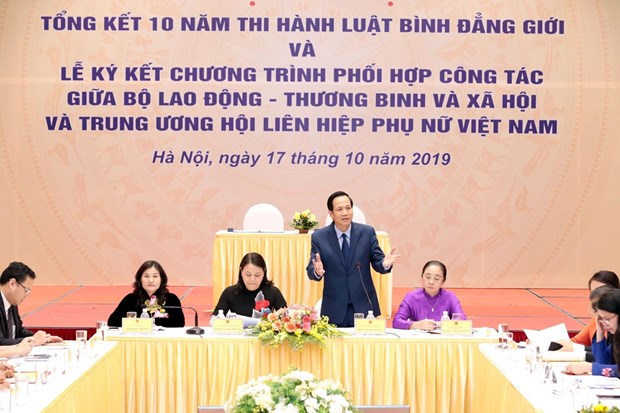Better awareness of women’s political participation needed: minister
Thứ Sáu, 18/10/2019, 19:41
It is necessary to further promote public awareness of women’s empowerment, especially their political participation, although the percentage of women in Vietnam’s parliament is currently higher than the global average, said a minister.
 |
|
Minister of Labour, Invalids and Social Affairs Dao Ngoc Dung (standing) speaks at the conference in Hanoi on October 17 (Photo: VNA) |
It is necessary to further promote public awareness of women’s empowerment, especially their political participation, although the percentage of women in Vietnam’s parliament is currently higher than the global average, said a minister.
At a conference reviewing the 10-year implementation of the Law on Gender Equality held in Hanoi on October 17, Minister of Labour, Invalids and Social Affairs Dao Ngoc Dung noted an important change over the past years is that there has been an observable improvement in men’s awareness of the role of women and girls, which can be seen in each family.For the time ahead, it is necessary to further promote public awareness of the empowerment of women, especially their right to participate in politics, he said.
The ministry reported that a number of achievements have been obtained after 10 years of the law implementation.
Notably, women’s political participation at all levels has increased. The numbers of female members of the Politburo and the Party Central Committee have risen for three tenures. For the first time, Vietnam has had a chairwoman of the National Assembly (NA) and three female Politburo members.
Besides, 27.1 percent of the NA deputies are women, higher than the averages of 23.4 percent in the world and 18.6 percent in Asia. Women are also holding key positions in 13 of the 30 ministries and ministry-level and Government agencies, along with 16 of the 63 provincial-level localities.
The rate of women-owned businesses also soared from 4 percent in 2009 to 27.8 percent in 2017 – highest in Southeast Asia, statistics show.
However, participants in the conference pointed about certain shortcomings in the Law on Gender Equality, blaming them on the fact that relevant parties still lack close coordination during implementation, authorities of some localities have yet to pay due attention to gender equality, and gender bias remains popular in the public, even among officials and civil servants.
The Ministry of Labour, Invalids and Social Affairs said it will step up gender mainstreaming in activities, programmes and projects of sectors and localities; boost communications about and implementation of gender equality-related policies and laws, and better the enforcement effectiveness of the Law on General Equality.
It expects that the policy system on gender equality will be perfected, and relevant public services will be provided nationwide by 2030.
In particular, the ministry has proposed the NA increase the monitoring of policy and law implementation, as well as the gender mainstreaming in law making and budget allocation. It has also asked the Government to push ahead with fine-tuning policies on gender equality and carry out some programmes and projects to narrow gender gap in some sectors with inequality.
VNA

